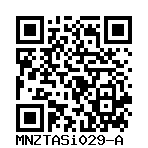MS_0029.1
MNZTASi029-A
General
Cell Line |
|
| hPSCreg name | MNZTASi029-A |
| Cite as: | MNZTASi029-A (RRID:CVCL_E4Y2) |
| Alternative name(s) |
MS_0029.1
|
| Cell line type | Human induced pluripotent stem cell (hiPSC) |
| Similar lines |
|
| Last update | 26th August 2024 |
| User feedback | |
Provider |
|
| Generator | Menzies Institute for Medical Research (MNZTAS) |
| Owner | Menzies Institute for Medical Research (MNZTAS) |
| Distributors | |
| Derivation country | Australia |
External Databases |
|
| BioSamples | SAMEA115863646 |
| Cellosaurus | CVCL_E4Y2 |
General Information |
|
| * Is the cell line readily obtainable for third parties? |
Yes Cell line can only be used in: research in neurodegenerative diseases or other human health conditions
Research use: allowed
|
Donor Information
General Donor Information |
|
| Sex | female |
Phenotype and Disease related information (Donor) |
|
| Diseases | A disease was diagnosed.
|
Donor Relations |
|
| Other cell lines of this donor | |
External Databases (Donor) |
|
| BioSamples | SAMEA115863655 |
Ethics
| Has informed consent been obtained from the donor of the embryo/tissue from which the pluripotent stem cells have been derived? | Yes |
| Was the consent voluntarily given? | Yes |
| Has the donor been informed that participation will not directly influence their personal treatment? | Yes |
| Can you provide us with a copy of the Donor Information Sheet provided to the donor? | No |
| Do you (Depositor/Provider) hold the original Donor Consent Form? | Yes |
| Please indicate whether the data associated with the donated material has been pseudonymised or anonymised. | anonymised |
| Does consent explicitly allow the derivation of pluripotent stem cells? | Yes |
| Does consent prevent CELLS DERIVED FROM THE DONATED BIOSAMPLE from being made available to researchers anywhere in the world? | No |
Does consent permit research by | |
| an academic institution? | Yes |
| How may genetic information associated with the cell line be accessed? | Controlled Access |
| Will the donor expect to receive financial benefit, beyond reasonable expenses, in return for donating the biosample? | No |
| Has a favourable opinion been obtained from a research ethics committee, or other ethics review panel, in relation to the Research Protocol including the consent provisions? | Yes |
| Name of accrediting authority involved? | University of Tasmania Human Research Ethics Committee |
| Approval number | H0016915 |
| For generation of the cell line, who was the supplier of any recombined DNA vectors or commercial kits used? | |
hIPSC Derivation
General |
|
| Source cell type |
A peripheral blood cell with a single nucleus. This category includes lymphocytes and monocytes.
Synonyms
|
| Source cell origin |
The portion of the upper extremity between the shoulder and the elbow. For clinical purposes this term is also used to refer to the whole superior limb.
Synonyms
|
| Source cell type (free text) | Peripheral blood mononuclear cells isolated from blood collected from arm |
Reprogramming method |
|
| Vector type | Non-integrating |
| Vector | Sendai virus |
| Is reprogramming vector detectable? |
No |
| Methods used |
RT-PCR
|
| Files and images showing reprogramming vector expressed or silenced | |
Vector free reprogramming |
|
Other |
|
| Derived under xeno-free conditions |
Unknown |
| Derived under GMP? |
Unknown |
| Available as clinical grade? |
Unknown |
Culture Conditions
| Surface coating | Matrigel/Geltrex |
| Feeder cells |
No |
| Passage method |
Enzymatically
Dispase
|
| Medium |
mTeSR™ Plus
|
Characterisation
Analysis of Undifferentiated Cells
Microbiology / Virus Screening |
|
| Mycoplasma | Negative |
Genotyping
Karyotyping (Cell Line) |
|
| Has the cell line karyotype been analysed? |
Yes
Female
|
Other Genotyping (Cell Line) |
|


Login to share your feedback, experiences or results with the research community.